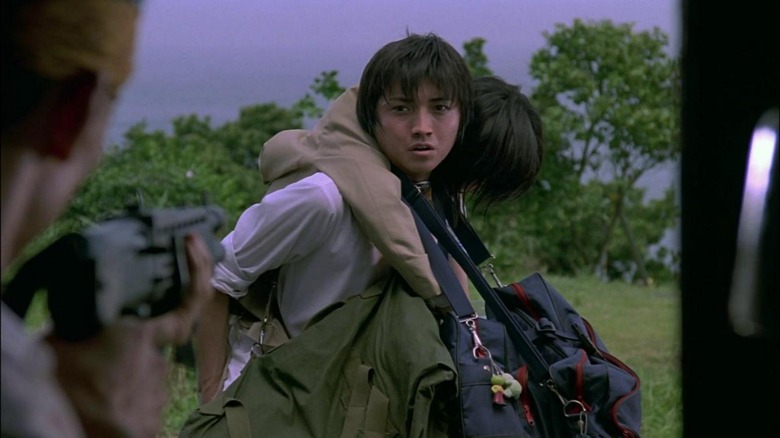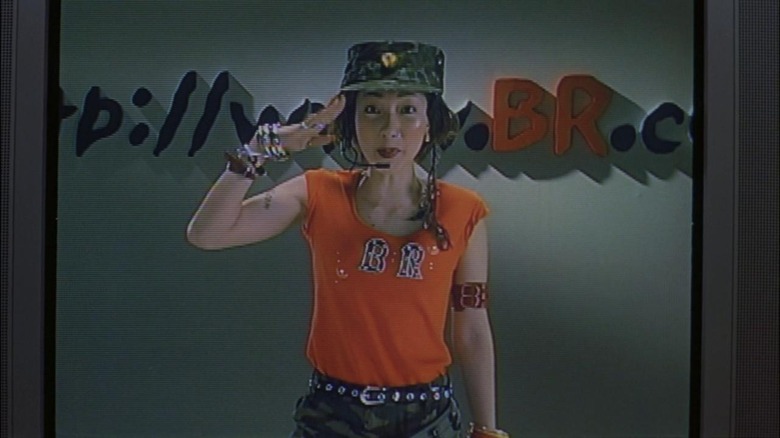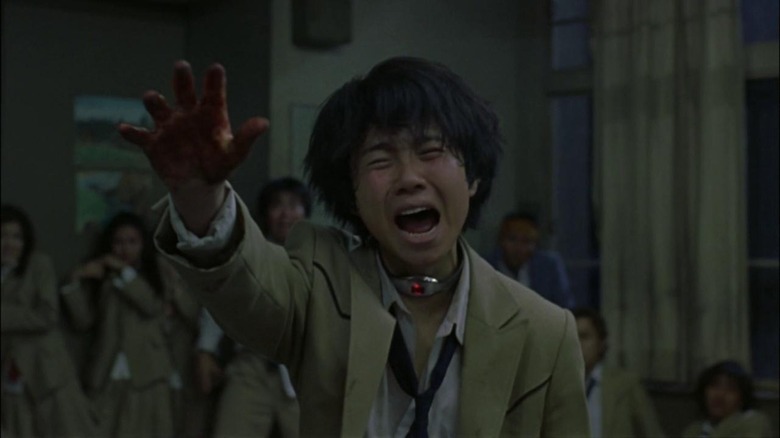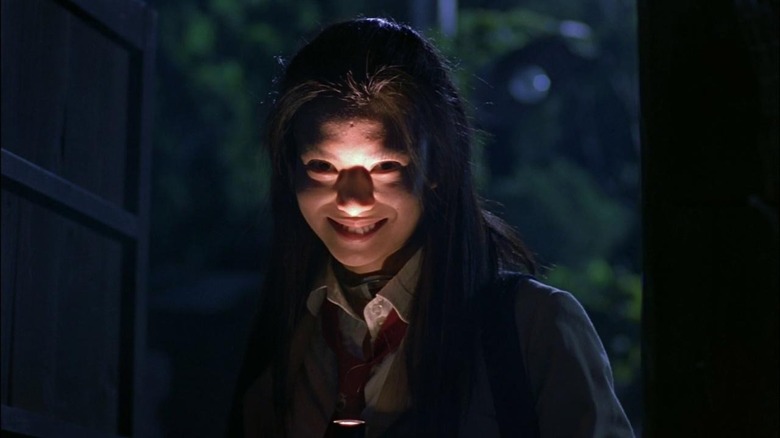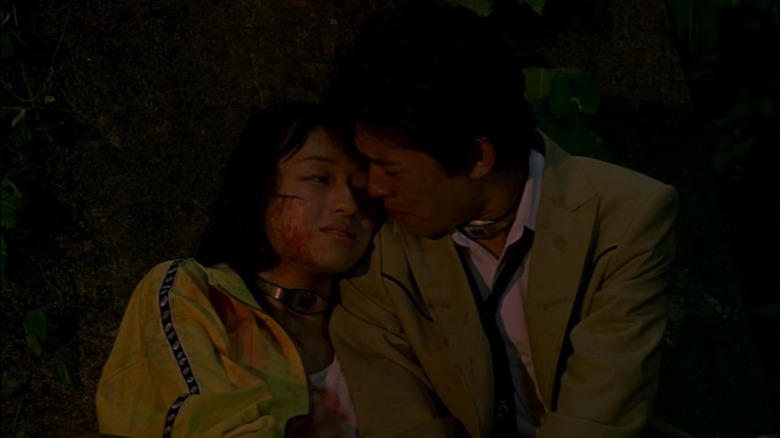Why The Battle Royale Remake Was Canceled For Good
It's become a cliche. Take unruly kids, put them in an arena, and make them kill each other. Today, it's "Fortnite." Yesterday, it was the TV series "The 100." Before that, the young adult novel series "The Hunger Games" broke records. But the start of it all was "Battle Royale," the poisoned tree from which the death game blossomed. Initially published as a novel in 1999, it was adapted into an acclaimed film in 2000. Since then, it has influenced countless works of art in both the United States and abroad. "Battle Royale" wasn't the first story of its kind; Stephen King's "The Long Walk" made teenage boys walk until they dropped dead back in 1979, while manga artist Nobuyuki Fujimoto's "Gambling Apocalypse Kaiji" in 1996 laid the path for later hits like "Squid Game." But there's a simplicity to "Battle Royale," in its willingness to ground horrific murder and death in current events rather than an indefinite future, that sets it apart from its peers.
As with any great film made outside of the United States, there were those hungry to steal that same lightning for themselves. Rumors spread in 2006 that a remake was imminent, hard on the trail of successful reimaginings of films like "Ju-On" and "Internal Affairs." But in the years to come, the film's producers would confess that the project was long dead, a casualty of current events and the changing Hollywood market. Hollywood has since moved on to the literary successors of "Battle Royale," including the military time loop drama "All You Need is Kill" (adapted as the surprisingly very good "Edge of Tomorrow"). In the meantime, "Battle Royale" itself has remained a cult film among cult films, a movie so incendiary that not even the American movie industry could repurpose it.
'This is the one I'm going to be most careful with'
The initial rumors suggested that New Line Cinema had purchased the rights to "Battle Royale" for audiences in the United States. But according to an article that followed in the New York Times, this wasn't quite true. New Line was in the final stages of purchasing the rights, and the remake producer-king Roy Lee was on board. Yet the deal had not yet been closed, and the Times even suggested that rights-holder Toei had been spooked by the earlier leak. In the Times piece, Lee reassured skeptical fans that he had their best interests in mind. "I would never want to make a movie I thought was bad ... this is the one I'm going to be the most careful with." He also suggested that doing the film's violence justice would require at least a hard-R rating.
At the time, there was reason to be cautiously optimistic. If producers of "Battle Royale" at New Line were fans who respected the film, there was a chance that not only would the remake would be made, but that it could be good.
Unfortunately, two events killed the remake stone dead. The first was the Virginia Tech shooting in 2007, the deadliest school shooting in the history of the United States at the time. Mass student violence had already been a sore point in the country, with the ghost of Columbine still in the media's rearview mirror. Virginia Tech brought that specter roaring back into the light. Already in poor taste, the idea of producing a film about students killing each other immediately became even more gauche. Lee and his production studio, Vertigo Entertainment, were forced to put the project on the back-burner until audiences were ready for it again.
'It's unfair, but that's reality'
The second was the release of "The Hunger Games" in 2008. Written by Suzanne Collins, the novel told the story of a young woman in a post-apocalyptic future who takes her sister's place in a government-sanctioned death game against other children. It completed the transformation of the publishing industry that the "Harry Potter" series began, leading to a sea of copycats and the explosive growth of the young-adult market. Just a few years later, the film version of "The Hunger Games" released in 2012 to become one of the highest-grossing films of that time period in the United States. The age of commercial dystopian fiction had arrived, and its standard-bearer was "The Hunger Games," not "Battle Royale."
The question of whether or not Collins was inspired by "Battle Royale" is an ongoing debate (personally speaking, I don't believe she was). For our purposes, the problem with "The Hunger Games" is not that it plays in a comparable sandbox to "Battle Royale," but that it supplanted "Battle Royale" in the minds of audiences in the United States at that time. Producers like Roy Lee had made their career buying the rights to proven hits from Asia, recreating them with actors from Hollywood and selling them to naive American audiences. Competing against another property occupying the same ground was a different matter entirely, and too risky for his tastes. "Audiences would see ['Battle Royale'] as just another copy of 'Games,'" he said in an interview with The Wall Street Journal. "Most of them wouldn't know that 'Battle Royale' came first. It's unfair, but that's reality."
'I'm not sure we should be writing stories like this'
Frankly, "Battle Royale" has never had an easy time of it. The initial draft of the novel was submitted to the prestigious Japan Horror Novel Award, but rejected by all four judges despite grudging respect in their remarks for what it had accomplished. Masao Higashi, one of those judges, gives context for their decision in the essay "The Fight the Night Before," collected in "Battle Royale Slam Book." A rise in youth crime coupled with a shocking murder by a Kobe junior high school student in 1997 led intellectuals to push back fervently against works like "Battle Royale." "Giving the prize at a time like this to a work that has junior high school students killing each other would be a definite negative..." said judge Katsuhiko Takahashi. Judge Mariko Hayashi was even clearer in her assessment: "I"m not sure we should be writing stories like this."
The shocking premise of "Battle Royale" likely bears some responsibility for its popularity. But contrary to the opinions of these judges, "Battle Royale" is also more than a simple portrait of nihilism. Its message is not that evil lurks in every human heart, even children and teenagers. Its message is that society has so badly failed children and teenagers that they are given no choice but to kill each other. Societal problems have causes, and the apparent rising wave of youth crime in Japan did too. The real challenge of a "Battle Royale" remake was to capture not just the source material's sickening violence, but its condemnation of a generation of unimaginative adults who blame their children for problems they are responsible for.
'If you have the courage you can sneak in'
At the end of the day, though, it doesn't matter whether a "Battle Royale" remake is ever made. Certainly, an English language version of the film might make it more accessible to audiences unable to read subtitles, or who rely on spoken dialogue to parse movies. Not to mention that society in the United States is as riddled with contradictions ripe for skewering as Japan was at the time of the publication of "Battle Royale."
But I believe that Roy Lee did not work to produce a remake of "Battle Royale" with these objects in mind. I believe that Roy Lee worked to produce a remake of "Battle Royale" because he believed that audiences in the United States were too lazy to seek out the original. If you have read to the end of this piece, you are perfectly capable of tracking down a copy of the original film. According to horror historian Grady Hendrix, "Battle Royale" director Kenji Fukusaku famously said to an audience of children, "if you have the courage, you can sneak in. And I encourage you to do so." If children can do it, we can too.
